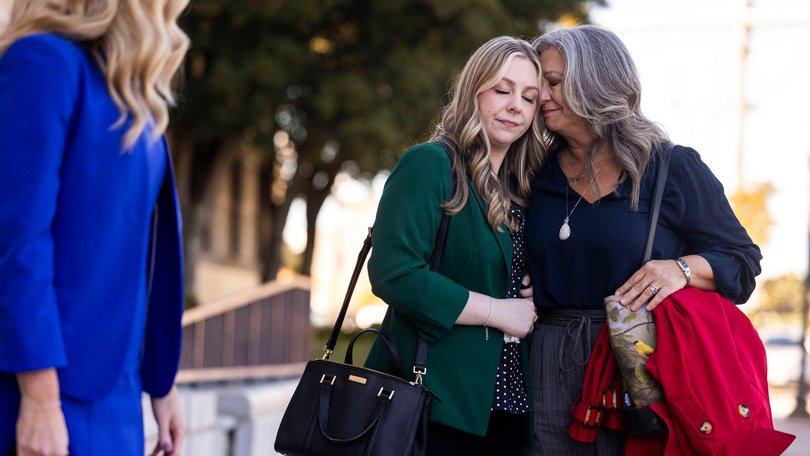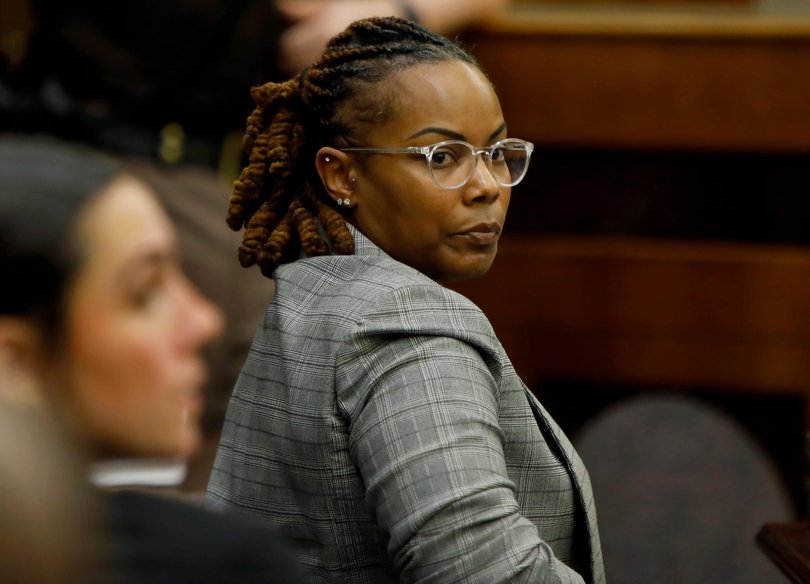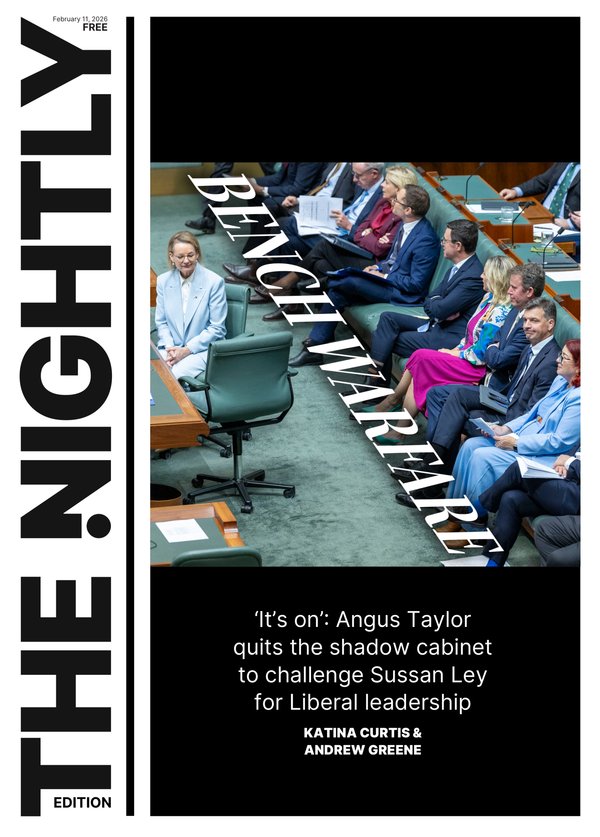Abby Zwerner: Virginia teacher shot by student, wins $US10m suit against former assistant principal
Abby Zwerner, formerly a teacher at Richneck Elementary School, was shot by her first grade student in 2023.

Abby Zwerner, the teacher who was shot by her 6-year-old student at a Virginia elementary school, was awarded $US10 million ($A15 million) in her civil suit against the school’s former assistant principal.
The jury deliberated 5½ hours over two days after a six-day trial.
The $US40 million suit hinged on whether Ebony Parker, the former assistant principal at Richneck Elementary School in Newport News, Virginia, was grossly negligent because she failed during several opportunities to thwart the threat in the hours before Ms Zwerner was shot in 2023.
Sign up to The Nightly's newsletters.
Get the first look at the digital newspaper, curated daily stories and breaking headlines delivered to your inbox.
By continuing you agree to our Terms and Privacy Policy.Dr Parker resigned after the shooting and faces eight felony child abuse charges in a trial set for mid-November.
Dr Parker did not testify during the trial, which began with jury selection on October 27. The verdict is likely to be appealed.
Ms Zwerner was shot at about 2pm on January 6, 2023, when her first-grade student pulled a 9mm handgun from his jacket pocket and shot her through her left hand. The bullet sliced through and narrowly missed her heart. It lodged by her spine and close to her aorta, so it cannot be safely removed.
“I thought I had died. I thought I was either on my way to heaven or in heaven,” Ms Zwerner testified in court, her voice breaking. “Then it all got black, and so I then thought I wasn’t going there.
“And then my next memory is I see two co-workers around me, and I process that I’m hurt and they’re putting pressure on where I’m hurt.”
Ms Zwerner said she has undergone six surgeries and has been diagnosed with post-traumatic stress disorder. An expert forensic psychiatrist who testified on her behalf said she suffers from nightmares, anxiety and intrusive memories of that day.
Ms Zwerner, who no longer teaches at Richneck, completed cosmetology school, something Dr Parker’s attorneys mentioned in questioning the ongoing severity of her hand injury, which one of Ms Zwerner’s physicians witnesses described as the kind he saw on the battlefield.
In closing arguments Wednesday afternoon, one of Ms Zwerner’s lawyers argued that Dr Parker had several chances to intervene once she was told the student may have had a gun.
“A gun changes everything,” Kevin Biniazan said.
“You stop and investigate. That’s not what happened. … It was Dr Parker’s job to investigate.”
He noted that teachers and staff members told Dr Parker about their concerns that Ms Zwerner’s student had a gun. “Each of them sounded the alarm, and they waited for the cavalry. No one came,” he said.
Sandra Douglas, one of Dr Parker’s lawyers, argued that the idea of a 6-year-old bringing a gun to school and shooting a teacher was inconceivable except in hindsight.
“It was unforeseeable. It was unthinkable,” she said about the shooting. “And it was unprecedented.”
She argued that Ms Zwerner and other teachers and staff members had opportunities to intervene and did not, noting a defence expert on Monday testified that Dr Parker had not been negligent or indifferent in her actions that day.
Ms Zwerner and the others did not remove the boy’s backpack, she said. They did not remove the boy. They did not further investigate claims by students, including two girls, that the boy had a firearm.

But Mr Biniazan argued that the teachers and staff worked as a team to report to Dr Parker, following school procedures. “One person had all the puzzle pieces, and that person was Dr Parker,” he added.
A 24-page special grand jury report filed last year found Dr Parker was warned three times on the day of the shooting that the boy had a weapon but failed to do anything.
A reading specialist, a music teacher, a guidance counsellor and another first-grade teacher testified that, beginning in midmorning, they warned Dr Parker of concerns that the boy had a gun.
Amy Kovac, the reading specialist, was in Dr Parker’s office late that morning when Ms Zwerner told her the boy had threatened to beat up a kindergartner during lunchtime and had been aggressive with a security officer.
Dr Parker, she testified, didn’t look up.
After Ms Zwerner left, Dr Parker told Ms Kovac that Ms Zwerner could call the boy’s mother to pick him up. Before the holidays, the boy had been on a modified schedule requiring a parent or guardian to be with him in school. Two days before the shooting, he had smashed Ms Zwerner’s phone, breaking the screen protector, and had been suspended for a day.
Later, Ms Kovac said, two unidentified girls told her the boy had a gun. Ms Kovac went to Ms Zwerner’s classroom, sat with him and asked him to check his bag. He refused.
After noon, as Ms Zwerner’s class readied for recess, the boy appeared to put something in his pocket. Ms Zwerner texted Ms Kovac, who told Dr Parker and searched the boy’s backpack during recess. She did not find a gun.
When Ms Kovac relayed Ms Zwerner’s observation to Dr Parker, she was rebuffed. “She did say, ‘Well, he has little pockets,’” Ms Kovac testified. “And I said he put it in his jacket pocket, and I was kind of mad, you know, and I walked away.”
During recess that day, Jennifer West, another first-grade teacher, testified that she watched the boy and another after being alerted by Ms Zwerner. That second boy later nervously told her the student had shown him the gun and threatened him if he told anyone. “He said that he would hurt us,” Ms West testified. “He would blow us up.”
Ms West called the school office, and a music teacher relayed the finding to Dr Parker. Eventually, Rolonzo Rawles, a guidance counsellor, also learned about the concerns. He spoke to the student who reported the gun and then went to Dr Parker, who told him the backpack had been searched.
He asked to search the boy. Dr Parker said his mother would be coming soon to pick him up and maybe they could wait until then.
The defence presented an expert witness on Monday who said Mr Rawles, Ms Kovac, Ms West and Ms Zwerner should have intervened.
Amy Klinger, a former professor and director of the educational leadership program at Ashland University in Ohio, testified for the defence on Monday that the staff and teachers at Richneck Elementary School, including Zwerner, had a responsibility to take more action than they did to stop a first-grader who may have had a gun.
Professor Klinger is also the co-founder of the Educator’s School Safety Network and the author of a 2009 book, “In Search of Safer Schools.” She has testified in about 25 other cases. Asked by Ms Douglas if she had an opinion about whether Dr Parker breached professional standards that day, she replied, “She did not.” Was she indifferent to Zwerner? “She was not,” Professor Klinger replied.
Dr Parker, she said, needed to “establish the credibility of the threat” with better information from the others.
Lawyers for the Newport News School Board have argued that Ms Zwerner can only claim workers’ compensation because she was a school employee when shot. Judge Matthew W. Hoffman, who is presiding over the trial, rejected that claim, ruling that being shot by a student isn’t an expected risk of elementary school teachers. The school board lawyers have said they expect that ruling to be overturned on appeal following the trial.
Special to The Washington Post
